By Muhammad Shehada.
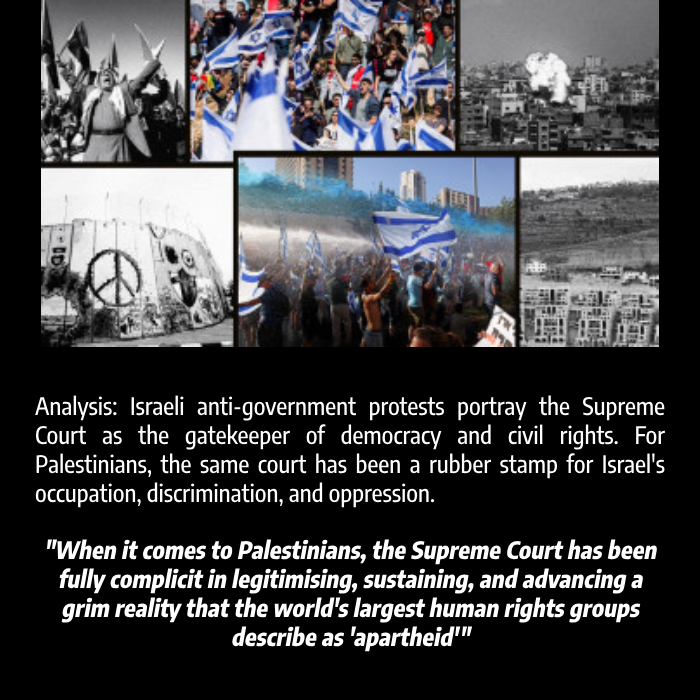
Watching Israeli demonstrations on the streets of Tel Aviv every Saturday garnering wide support, recognition, and praise domestically and internationally, a comparison promptly jumps to the minds of many Palestinians.
Not long ago, in 2018-19, tens of thousands of Palestinians in Gaza also took to the streets and marched to the perimeter fence with Israel every single week, unarmed and bare-chested, to demand their right to life and the removal of the Israeli siege.
The overwhelmingly non-violent protests were met by a disproportionate and unjustified level of lethal violence, where Israeli soldiers, taking potshots into the crowds of protesters, killed 223 Palestinians and wounded over 36,100. This included paramedics, journalists, children, women, and people with disabilities.
Strikingly, it was the very same Israeli Supreme Court that demonstrators in Tel Aviv are now fighting tooth and nail to protect that gave an unreserved greenlight to the Israeli military to rain live bullets on Palestinian demonstrations. The Supreme Court even refused to watch evidentiary footage documenting the army’s shooting of unarmed civilians.
This has been one of the reasons why most Palestinians have not shown any significant sympathy to the Israeli demonstrations to protect the Supreme Court and maintain the status quo.
The very same court has been a rubber stamp for Israel’s occupation, discrimination, and oppression against Palestinians.
The Supreme Court of apartheid
Israeli anti-government protesters have sought to portray the Supreme Court as a gatekeeper of democracy, liberalism, and civil rights, while proponents of Benjamin Netanyahu’s judicial overhaul claim the court is “elitist,” “leftist,” and biased against Israeli settlers.
When it comes to Palestinians, however, the Supreme Court has been fully complicit in legitimising, sustaining, and advancing a grim reality that the world’s largest human rights groups describe as “apartheid” as well as “crushing Palestinian rights,” as B’Tselem’s director noted.
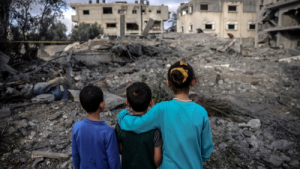
Analysis: Sixteen years after Israel’s blockade, the policy of collective punishment has failed to quell Palestinian resistance despite the isolation and impoverishment it has forced on Gazans living in an open-air prison.
READ: The failures of Israel’s blockade of Gaza, the longest siege of the 21st century
Approving caging Gazans in an open-air prison
A prominent example of this is the Israeli blockade on Gaza’s air, water, and land spaces since 2007 that has rendered the enclave “uninhabitable”. From the start, the Israeli Supreme Court upheld the government policy of cutting electricity and fuel flows to Gaza despite the evident dangers of such actions (e.g., to the health sector).
Thousands of petitions have been submitted to the Supreme Court related to Gaza, but the court turned down more than 99.9% of them. Only two cases were accepted, one related to a Gazan journalist shot by the army near the fence to be transferred for treatment abroad and another related to breast cancer patients whom the Israeli government banned from receiving treatment outside Gaza.
Greenlighting ethnic cleansing and state violence
Israel’s longest-running newspaper, Haaretz, dubbed the Supreme Court “the Occupation’s Rubber Stamp” as it okayed the ethnic cleansing of the entire Palestinian community Masafer Yatta to the clear benefit of settlers.
The court also ruled in favour of depopulating the Khan al-Ahmar village, an act that would split the occupied West Bank in two and prevent a viable Palestinian state. The court gave the village’s population a choice between being relocated next to a garbage dump or a junkyard.
Israel’s Supreme Court has been instrumental in the de facto annexation of the West Bank by facilitating and approving land grabs, settlement expansion, and the entrapment of Palestinians in small enclaves.
The Supreme Court also approved home demolitions and withholding the bodies of dead Palestinians as punitive Israeli policies of collective punishment exclusively exercised against Palestinians.
Ironically, one of the court’s chief justices, Noam Sohlberg, is an illegal settler himself who has been advocating for lenient treatment for Israeli terror attacks against Palestinians.
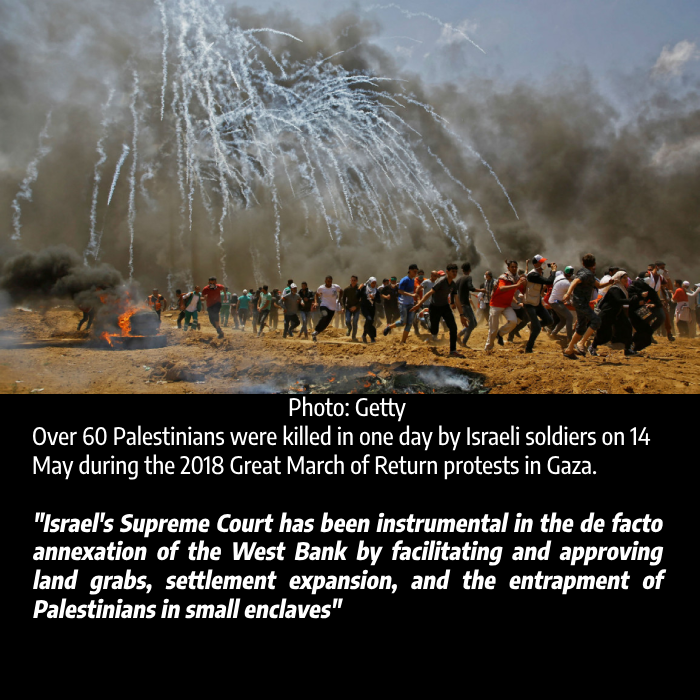
Criminalising peaceful resistance
In 2015, the Israeli Supreme Court made a landmark ruling in favour of an Israeli anti-boycott law that allows the Israeli government to “impose fines or withhold funding from Israeli NGOs calling for boycotts of businesses in all or parts of Israel” including the settlements in the occupied West Bank. The court’s ruling deemed boycotts against Israel “political terror”, and the court linked the BDS movement to Holocaust deniers.
Based on an Israeli anti-boycott legislation from 2017, the Supreme Court deported Human Rights Watch’s director in Israel-Palestine, Omar Shakir, in 2019 accusing him of publicly calling for boycotts against Israeli settlements. Human rights experts called these legislations “an ominous threat to free expression”.
The Supreme Court also approved Israel’s administrative detention of Palestinians without charge or trial, a practice Israel uses routinely to suppress and punish Palestinians, including politicians and activists.
Shielding war criminals
Many prominent Israeli demonstrators have made clear the Supreme Court shields them from any meaningful accountability for possible war crimes and crimes against humanity.
As Israel’s former Defence Minister, Moshe Yaalon, put it last April, “You know there are arrest warrants and lawsuits against IDF soldiers around the world. What stands between us and summons of politicians, officers and soldiers to the International Criminal Court is our Supreme Court”.
The ICC operates with a principle of complementarity, which means it refrains from interfering when a state’s independent and competent judiciary takes initiative in good faith to investigate and prosecute possible war crimes, even if such investigations and trials are merely for show.
For instance, the ICC dropped its inquiry into alleged British war crimes in Iraq despite finding a “reasonable basis to believe” atrocities may have been committed, because the British judiciary took the initiative to investigate, although without any real justice or accountability being upheld.
Hence, Netanyahu’s undermining of Israel’s judiciary risks rendering it incompetent in the eyes of the ICC, which would allow the ICC to prosecute Israelis complicit in possible war crimes.
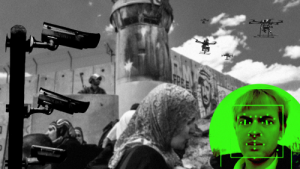
In-depth: Israel’s military occupation has become a laboratory for advanced surveillance systems, artificial intelligence, and spyware technology developed by Western corporations and Israel’s army.
READ: Automated Apartheid: How Israel’s occupation is powered by big tech, AI, and spyware
Netanyahu’s coalition wants more cruelty
Despite the Supreme Court’s key role in the oppression, dispossession, and subjugation of the occupied population, the Israeli right sees it as an impediment on their path of completely “crushing” the Palestinians and killing any hope for Palestinian statehood.
The Israeli liberal and centrist camp has for long been in favour of speaking softly and creating realities on the ground vis-à-vis the occupied Palestinian territory. For instance, settlement expansion has been state policy backed by the Supreme Court for almost six decades, as long as such expansion was incremental and calibrated so as to not anger the international community.
The ruling Israeli far-right government, however, is officially in favour of expediting and accelerating the destruction of the two-state solution and shows little regard for what the international community thinks. In that pursuit, the Supreme Court might slow down policies that the Israeli right wants to hastily push through.
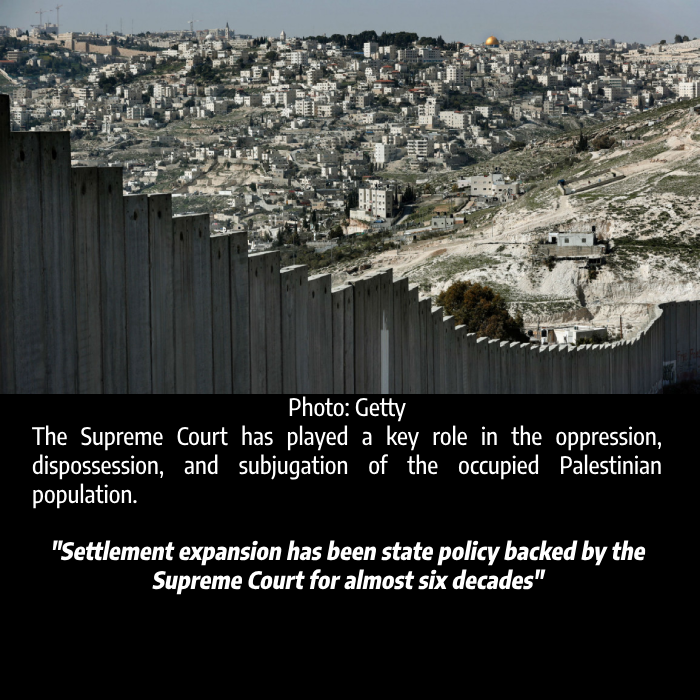
In fact, the architect of the judicial overhaul, Israel’s Justice Minister Yariv Levin, has made it clear the cancellation of the “rule of reasonableness” last week was in large part about the Palestinians and occupied territories.
The “reasonableness rule” allowed the Supreme Court to block government decisions that contradict ethical conduct and reasonable behaviour, and Levin accuses the court’s “unelected” judges of undermining democracy through this power.
However, the only five examples the minister listed about the “negative” effects of the reasonableness rule were all about the occupation and Palestinians. This includes overturning a government ban on bereaved Palestinian families to attend a co-existence and peace event in Israel and preventing the expulsion of three Palestinians from the West Bank to Gaza.
What the Israeli right wants from undermining the judiciary is unconstrained dispossession, expulsion, and subjugation of Palestinians, together with the unrestricted expansion of settlements on every inch of the occupied territories.
For instance, the Israeli Supreme Court once used the reasonableness clause in 2020 to strike down a law that legalised settlements built on stolen privately-owned Palestinian land. Cancelling the reasonableness clause would allow for reviving this law without obstacles.
Similarly, abolishing the reasonableness rule would allow for deporting Palestinians in East Jerusalem and the West Bank to the Gaza Strip; stripping Israeli Arabs of citizenship; demolishing Palestinian homes; reinstating the death penalty against Palestinians; and many more policies meant to crush Palestinians.
Muhammad Shehada is a Palestinian writer and analyst from Gaza and the EU Affairs Manager at Euro-Med Human Rights Monitor.
Follow him on Twitter: @muhammadshehad2
Source: The New Arab. 2 Aug 2023